Going to the Nordic Edge! A peek of tomorrow’s cities based on open data and new technologies!
So, recently I had a quite special experience as I got to go to the third edition of the Nordic Edge Expo, a Smart City and Technology Conference and Expedition in Stavanger Norway (my home city), only this time as a co-organiser of the conference! It was quite special to come home from abroad representing an international organisation at an event no more than 1000 meters from where I grew up! Anyways, I thought I would do a post both to share some pictures from the event (it is pretty cool!) and also explain briefly what a "Smart City" is and why it is an exciting area of development.
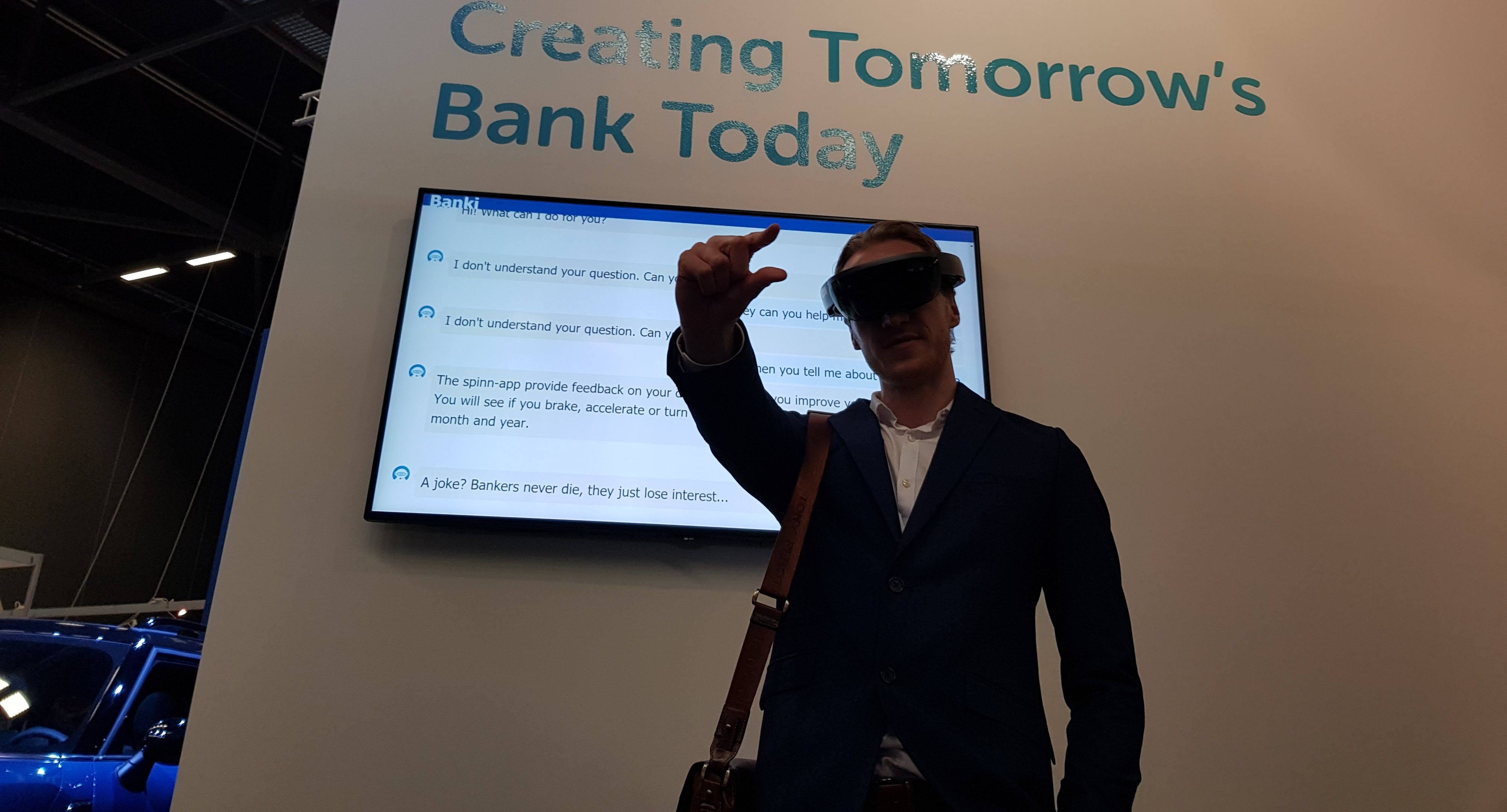
Me talking to the virtual robot assistant that currently takes care of most questions asked online by customers at the local Bank
But first, what is a “Smart” City?
The term “Smart City” has become quite popular recently. It refers to the way in which cities can make use of the different data it produces, as well new technologies, to make the city more efficient, sustainable, and more pleasant to live in for its citizens. The growing interest follows very closely with more recent developments in the internet of things, artificial intelligence and big data, robotics and autonomous vehicles, as well as renewable energy sources and green technologies. All of which provide new opportunities for a next-generation city!
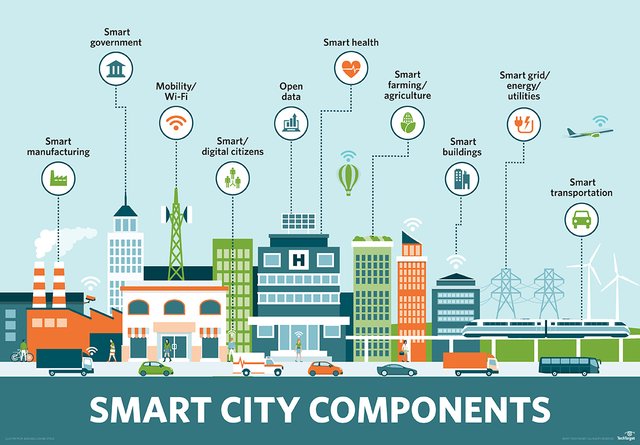
What makes a city smart? Well, there are many different components!
image source
So it seems that a "Smart City" is generally just a city that has 1. Adopted new data-driven technologies. And 2. Combines and utilises the potential in each technology to enhance the living standards of its residents. It is mostly just a slogan used to bring together people from many different fields of technology to look at how it can be applied to cities, and to facilitate a dialogue between the private sector, public sector, academia and the public in general about where one can and want to go. The Nordic Edge conference is the city of Stavanger's attempt to create such a meeting place, which has grown very quickly since the first edition 2 years ago. Then, ~500 participants joined, followed by just over 2000 the second year, and then more than 4500 this year, making it the largest Smart City conference in Europe. The event attracts a wide range of people from across the public and private sector as well as from academia, all coming together to discuss how open data powered by machine learning and artificial intelligence, combined with greener technologies, can help make the city more efficient, sustainable and enable a better living for its citizens.
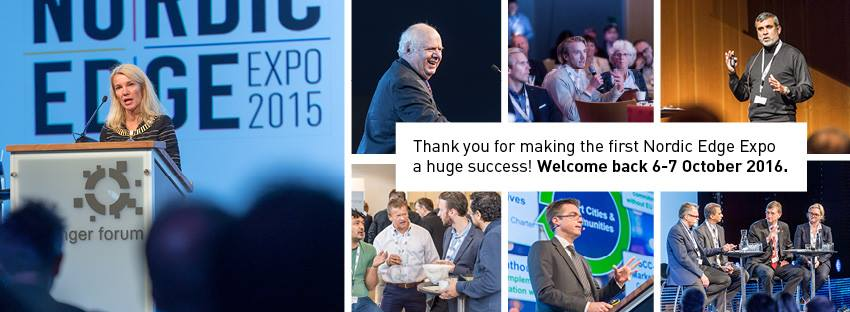
The official Nordic Edge banner after the first conference in 2015. Yup, that's me with the microphone on the upper central image!
Image credit: Noric Edge Expo
As a tech-enthusiast myself, I could not help but attend the conference the first time around. Before I left Stavanger to go work with the European Space Agency, I worked with the University to start a student incubator for students with an idea for a new StartUp company. I also helped create a new entrepreneurship and innovation programme for those interested in trying to solve a problem provided by a local company or public organisation. So I was very well connected to both the innovation and entrepreneur ecosystems of the region, as well as the IT companies and public/academic organisations working to foster more innovation.
Space and data
So why was I there as a co-host this time? As it happens, one of the areas we’ve been focusing on lately at my workplace is how satellites can benefit “Smart Cities”. So when we looked for ideal conferences or cities to host a session on how satellite data can benefit cities, it was easy for me to suggest the Nordic Edge Expo where I happened to have good connections with the organisers and many of the stakeholders involved.
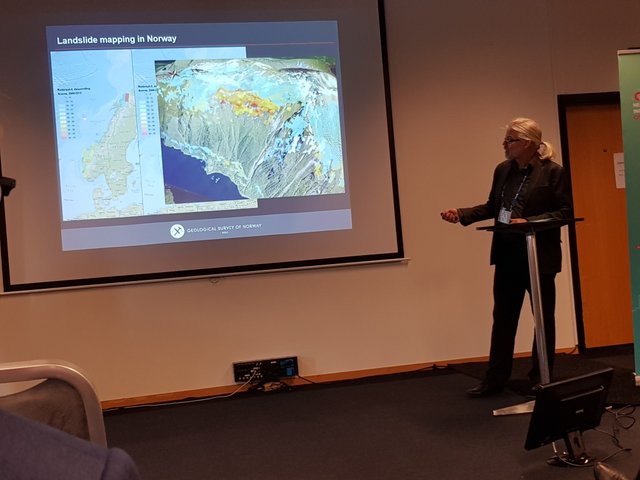
The Norwegian Geological Survey presents how they use satellite radar data to provide a nation-wide data-set of subsidence useful both to predict avalanches in the mountains and damages to infrastructures in the cities. A fun thing to note is that the image in his presentation here is the same I've presented in a much earlier steemit post here
Satellites generate a lot of data, much of which is essential, or at least complementary, to Smart City innovation. GPS Satellites help create databases on the mobility of everything from bicycles and cars, which can help city planners know where and when citizens move to optimise the placement of new roads. Imaging satellites can also provide information on air quality in different regions of the city over time, and measure the density of pollutants. By having frequently updated images of the city, municipalities can also monitor urban developments and use that information for new urban planning. I share many more such examples in my satellite series, such as how satellite images are used to predict the average income of a neighbourhood, to identify new building projects, or to measure subsidence in buildings and roads corresponding to damages to the infrastructure. The latter was actually presented at our conference, as me knowing their project very well from having both written about them for my steemit post I was quick to invite them as a speaker :)
Welcome Dinner with the Mayor of Stavanger
So here is one of the many things that made this experience unique. For many of these large conferences, it is customary for the municipalities to invite foreign participating speakers, partners and co-organisers to a welcoming event. A nice way to give people who may have their first time ever visiting the country a nice welcome! So, coming from an international organisation based in Paris with my Italian colleague, of course we were invited to a welcoming dinner with the mayor! A bit funny seeing as I grew up in Stavanger, and was now welcomed as a foreign guest to wine and dine with the politicians!
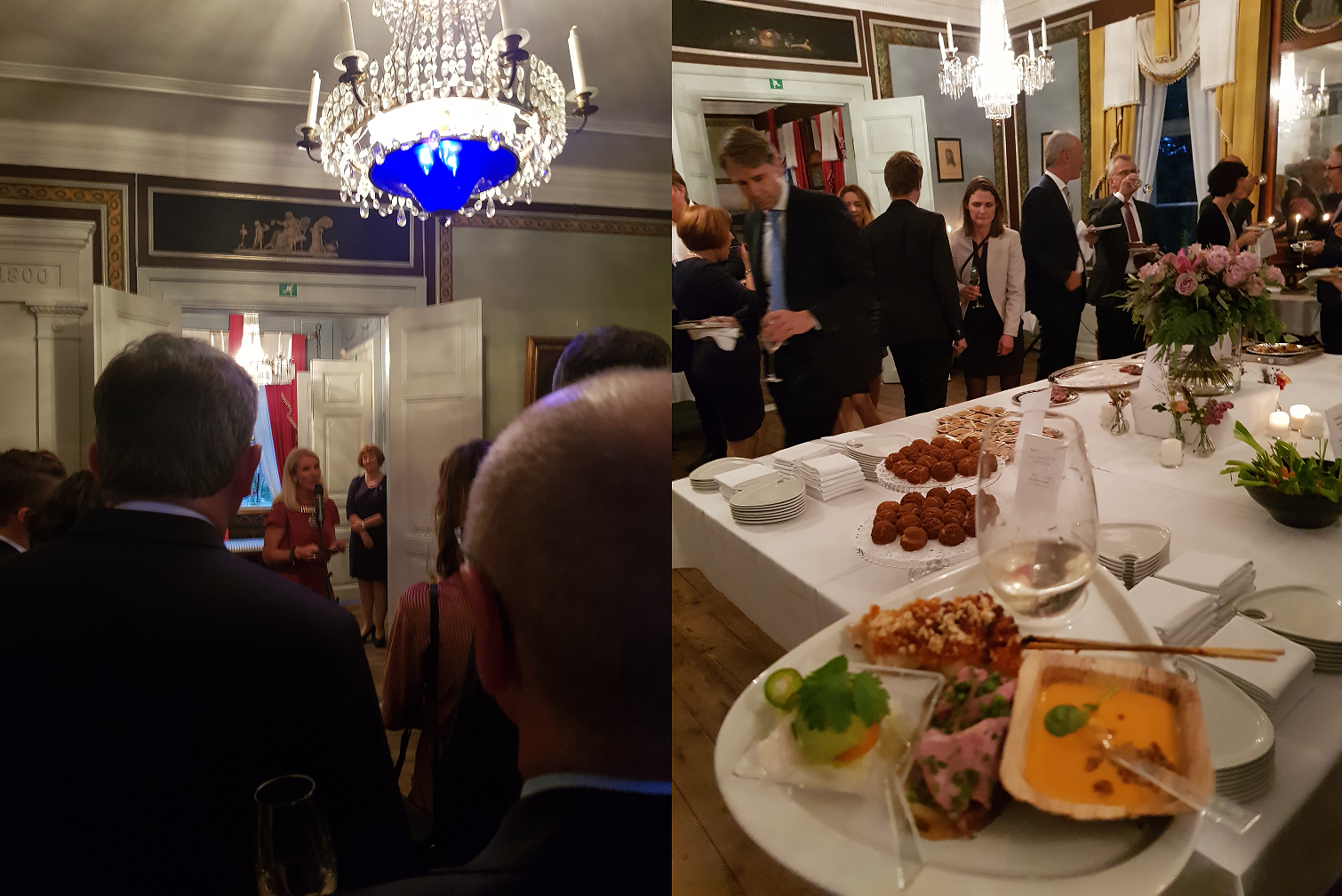
The Mayor of Stavanger City welcomes the guests to Stavanger followed by some fine local foods
The venue we got to use did not make it any less special, as it was nothing less than the residence reserved for the King whenever he visits Stavanger. Anyways, it was a great evening that I'm sure to remember!
Let’s have a look at the expo, shall we?
Most of the regions tech-companies had found their way to the expo and so the hall was filled with stands of people showing off their latest softwares or robotics. A self-driving bus took participants around the expo area, where people frequently jumped in front of the bus to test whether the sensors did recognize them quickly enough to stop. One company even had a self-driving robot roll around inside the expo stopping briefly around humans in order to tell them to go visit stand number 10 before opening a tray filled with wrapped in chocolates. The local power company had a series of "smart street lights" that turned on automatically when someone walked close to them. Service providers offering "Smart Home" solutions showcased how their systems allowed you to control light, heat, security and multimedia from your phone, or automatically, from wherever you might be. Municipalities were also there to share their strategies and roadmap to become a smart city (not admitting that they had been a dumb city before though).
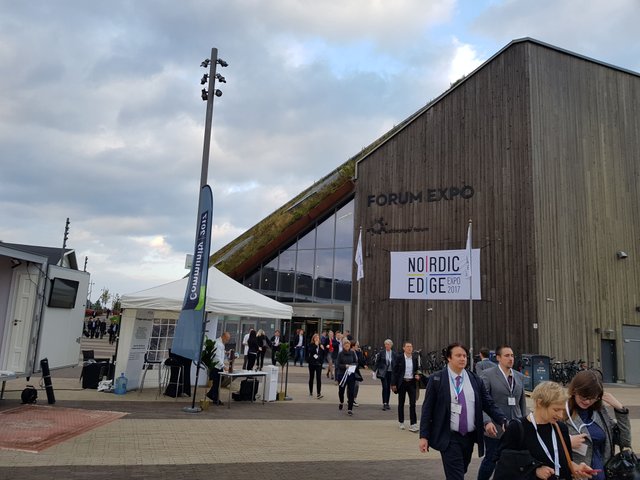
The conference took place in 2 hockey stadium-sized buildings. One containing the conference hall and rooms for different sessions, and one for the expeditions
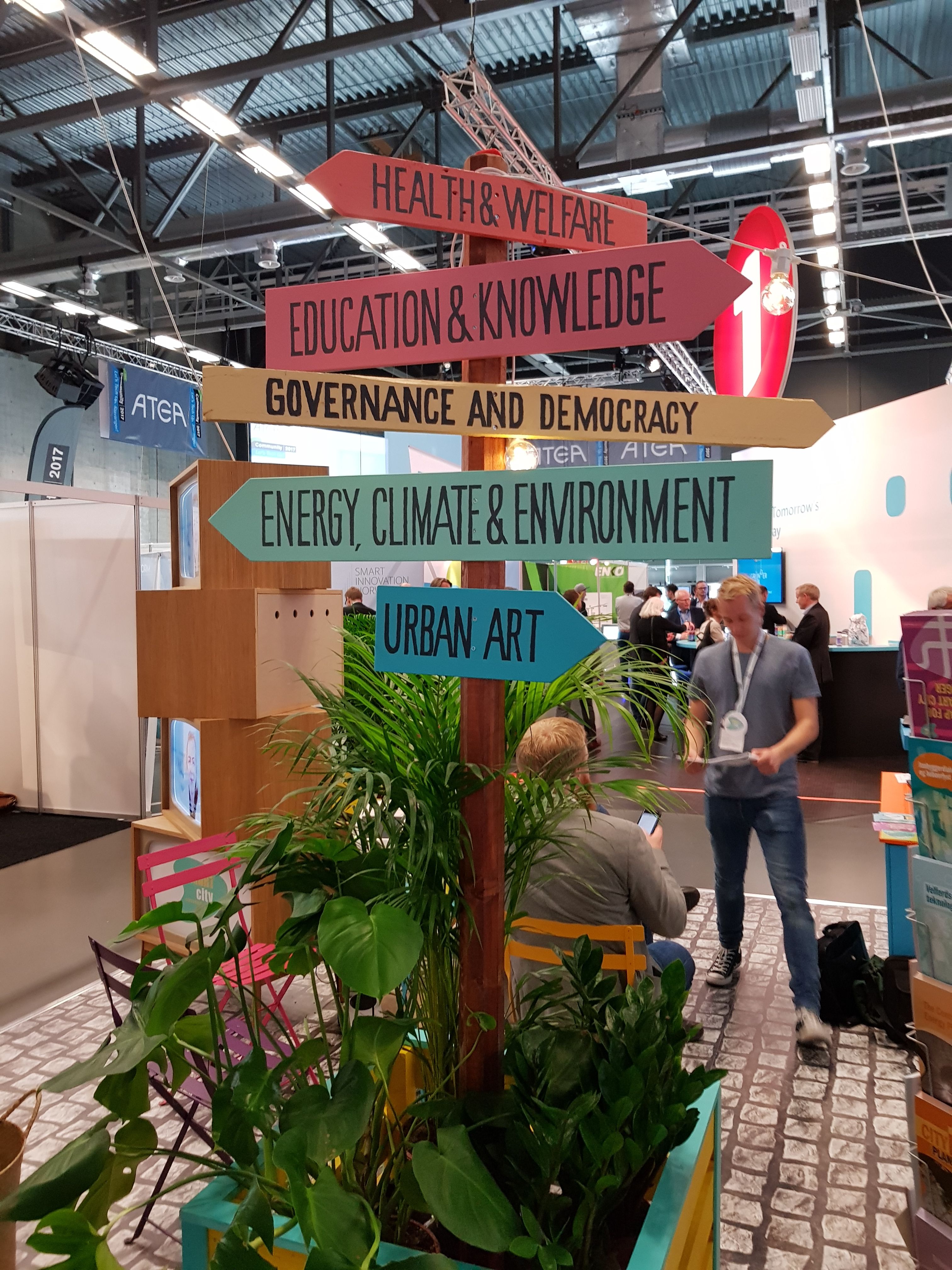
Apart from all the IT companies, there were also a lot of focus on EdTech, Healthcare technologies and renewables
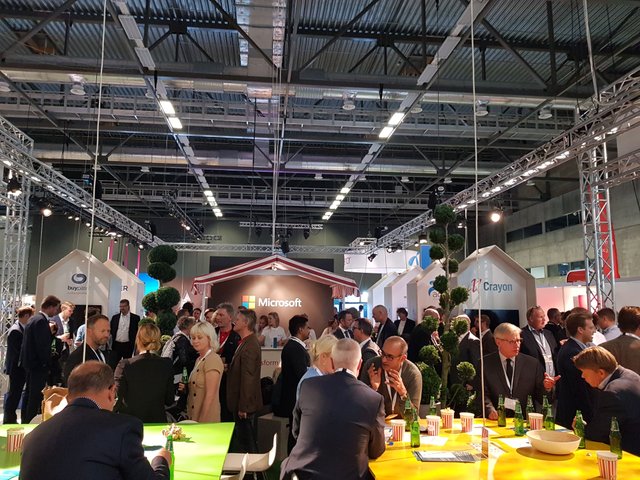
A lot of participants at this year’s Nordic Edge Expo! And a lot of beers as Microsoft scored a few points in most people’s books by having a happy hour with free Carlsberg to everyone!
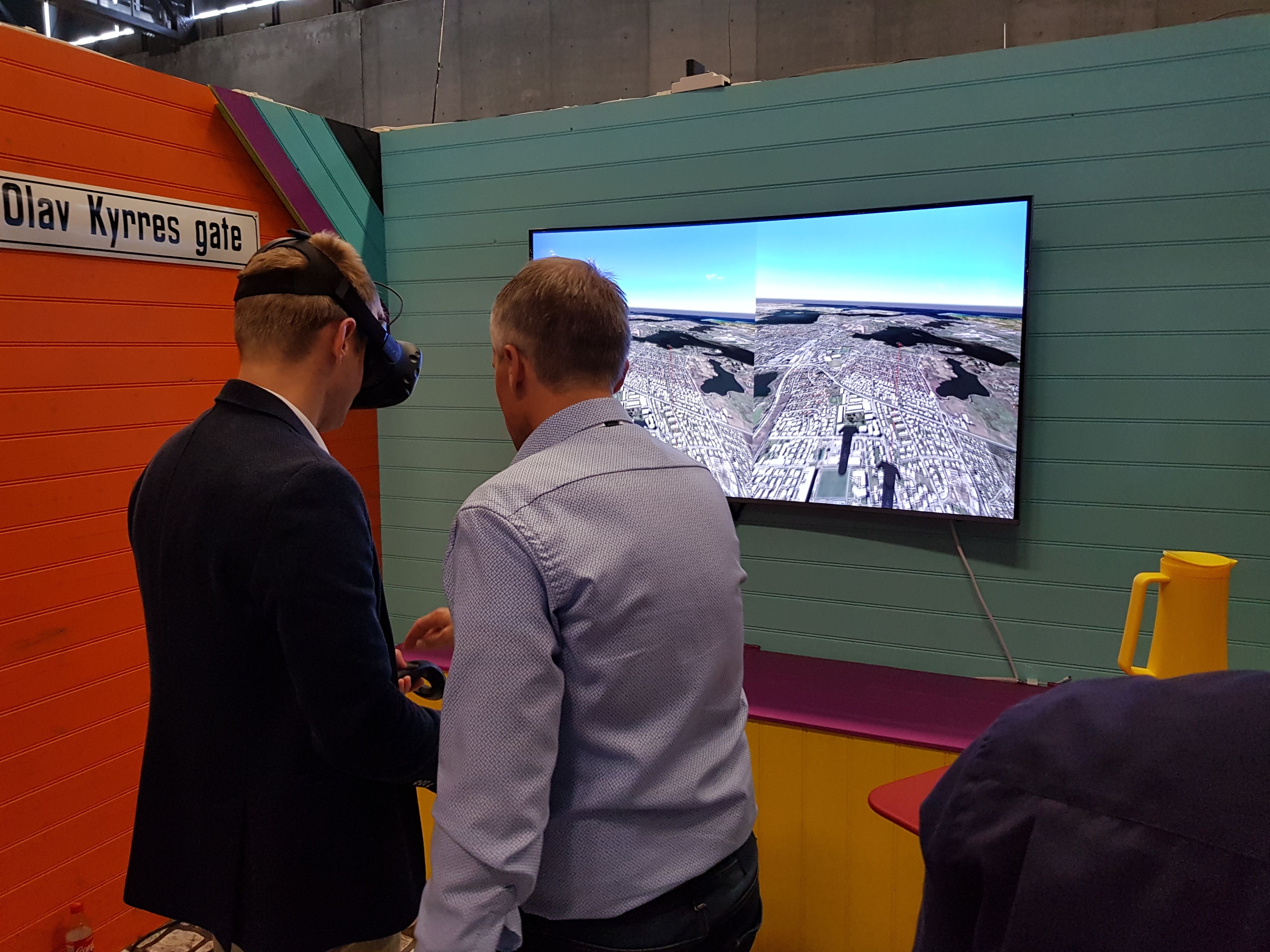
The Stavanger Municipality also had its own stand, showing a 3D model of the city and region that visitors could explore in virtual reality
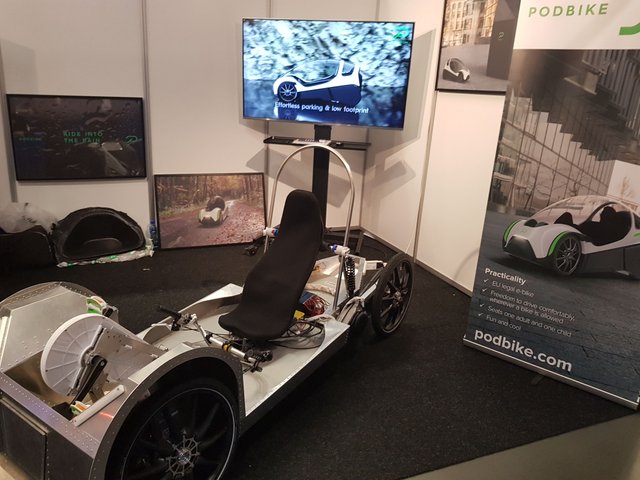
One of my favourite StartUps present at the expo is Podbike with their semi bike and electric car hybrid. A cheap and clever mode of transport.
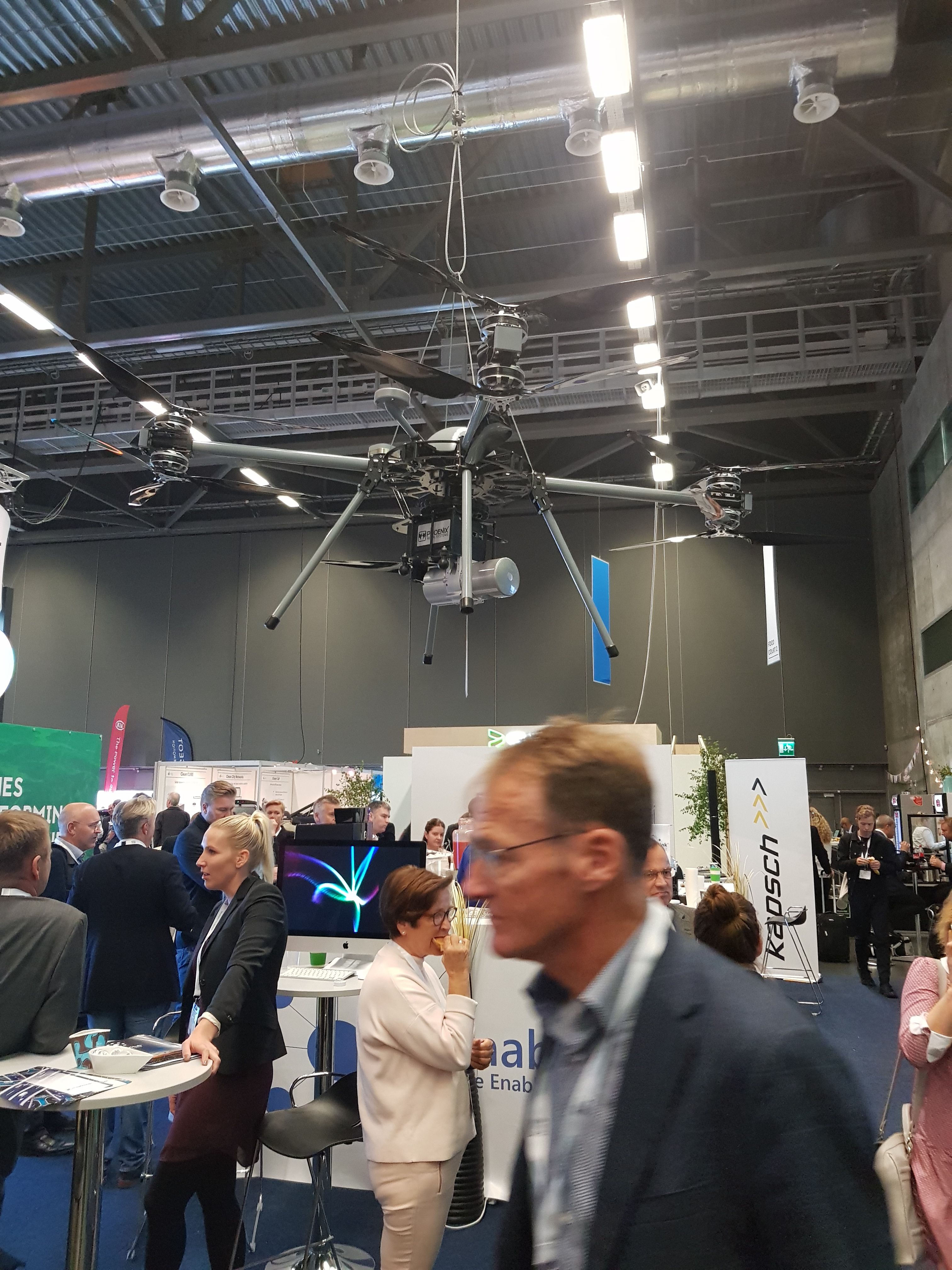
Drones are also hot when it comes to Smart cities. Many presentations include suggestions that drones will be delivering groceries to citizens, or be the first to arrive with a defibrillator in the case of a heart attack
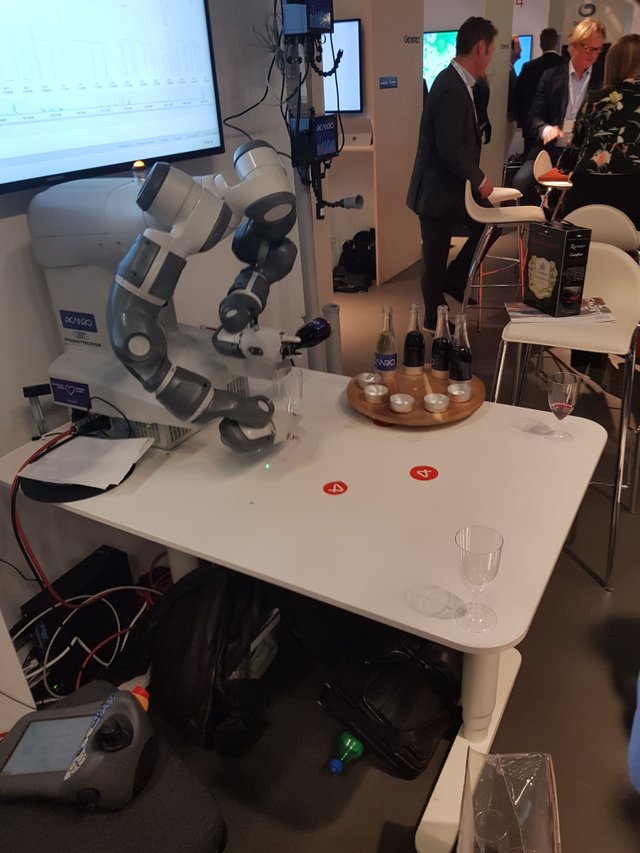
This handy little robot served wine to thirsty participants! All you had to say was either "white wine" or "red wine", and the robot would first select the right bottle and then pour you a glass. Easily my favourite robot at the expo!
The conference
The conference itself was interesting enough, although I have to say that there's a limit to how many times I can be impressed by someone talking about how big data, artificial intelligence and machine learning will disrupt everything. What was more interesting to see was demonstrations and analysis of the cities that have actually done something! And there were at least some cool examples.
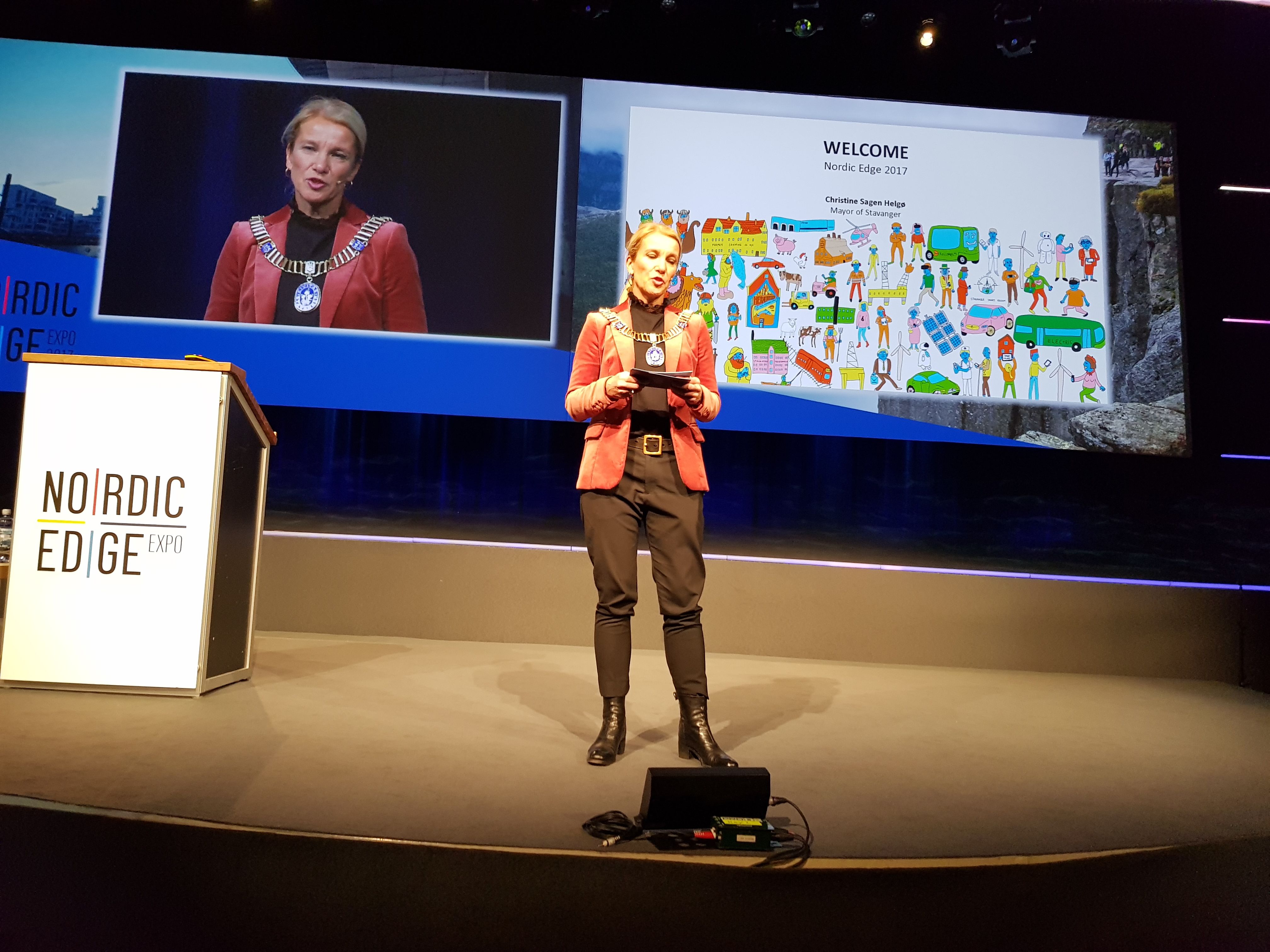
Stavanger Mayor Christine Sagen Helgø opens the Nordic Edge Expo 2017 conference programme
Stavanger has been very early in establishing its own "smart city strategy". It includes a new open data policy, where a lot of public data is made available for entrepreneurs and IT companies to build applications around to improve efficiency or provide new services. Stavanger is also in a period of transition, as it has often been referred to as the "Oil and gas capital of Norway" due to most of the country's oil and gas companies being located there. With a world-wide transition away from oil and gas, and a rapidly falling oil price in the last 3 years, Stavanger has faced a dire need to create new industries. Smart Cities, is seen as one such opportunity to make use of technologies developed for oil and gas for innovation also on shore.
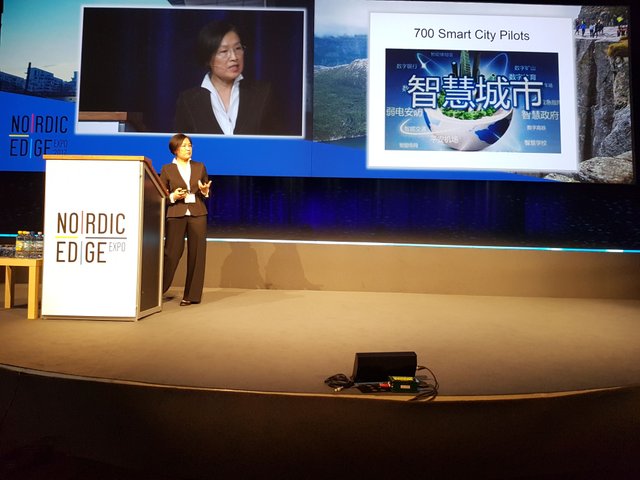
Changhua Wu, President of China Redesign Hub and Vice Chair of World Green Design Organisation, shared some of the projects being done in 700 Chinese cities piloting new smart city solutions
It's not only in the crypto-sphere that China is a hot topic, this year there were no less than 60 Chinese representatives. A large number for a relatively new conference in Norway. One thing is clear: China wants to take a leading position in green technologies and in implementing digital solutions in the public sector and also for their cities.
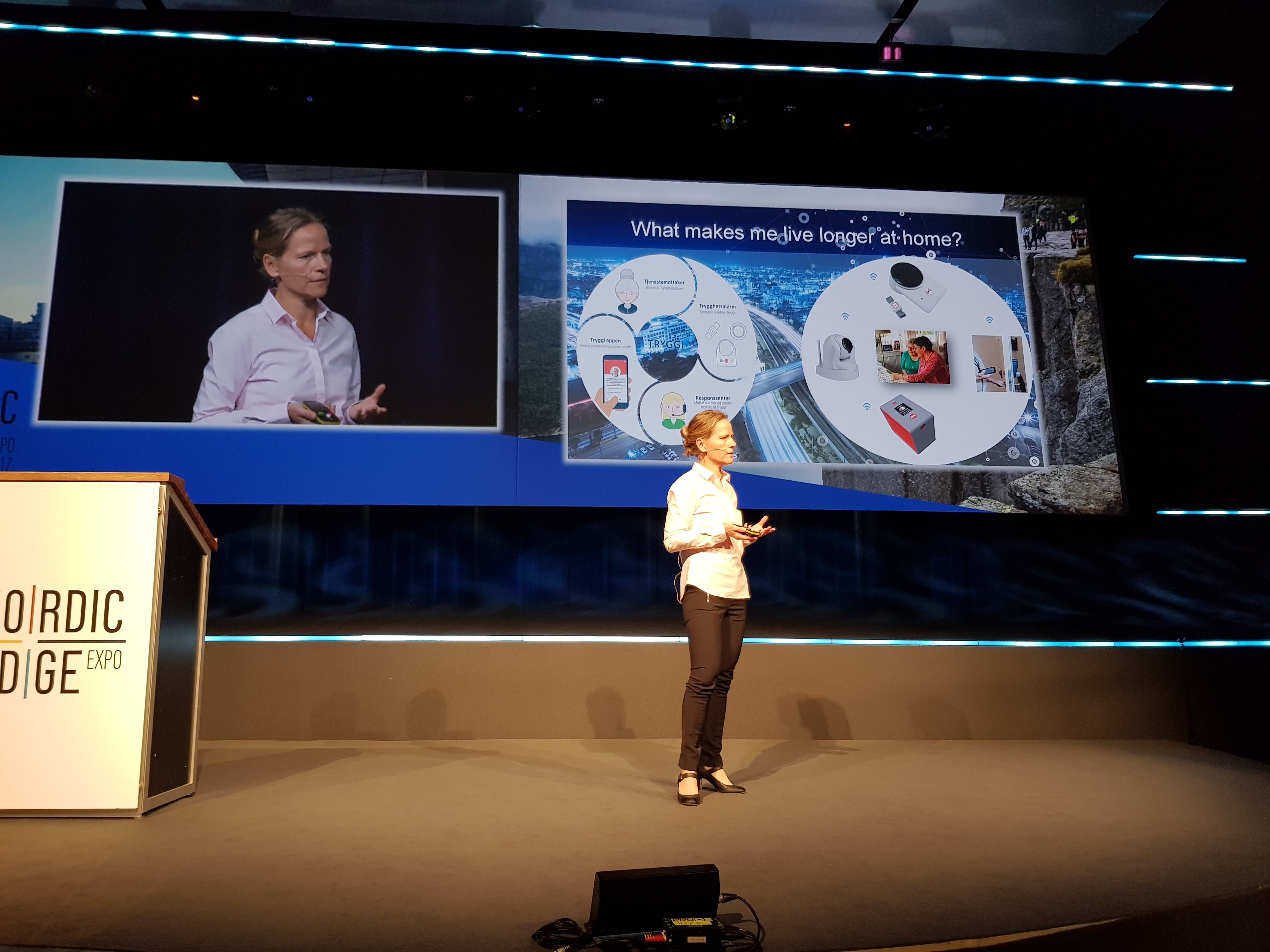
Annelene Næss, Director of Smart Digital at Telenor Norway shares how they work with their new "NBIoT (Narrowband Internet of Things) to bring more "things" online
One of the most promising areas where IoT is starting to be implemented is in the health-care sector. With an aging population, enabling people to live autonomously for an extra few years help massively reduce the cost and stress on elderly homes, as well as increasing the quality of life for senior citizens.
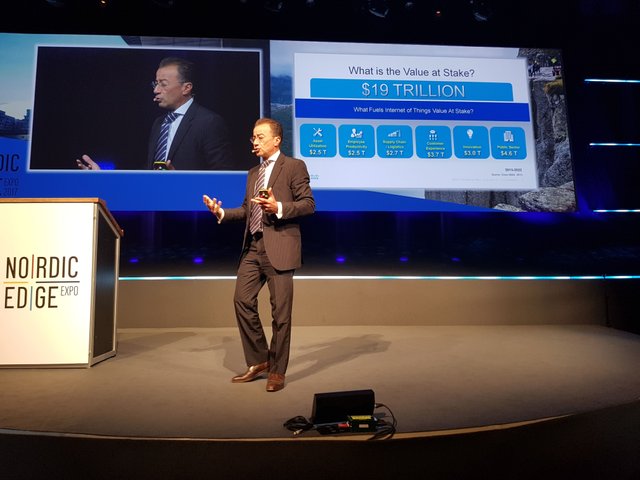
Amr Salem, Global Managing Director - Smart Cities and IoT for Public Sector at Cisco Systems talking about the building blocks of city digitisation
Cisco has been very early in stating how large they see the business opportunity for the Internet of Things and digital / “smart” innovation to be. Chances are good that you've already seen the figure of 19 Trillion dollars thrown around as the estimated business opportunity in IoT. But just like with cryptocurrencies, this is mainly speculation, and also just like there are many different coins fighting to become the adopted solution to a problem they are trying to solve, so too there are many different IoT standards fighting to become adopted. And Cisco is at the very heart of this battle.
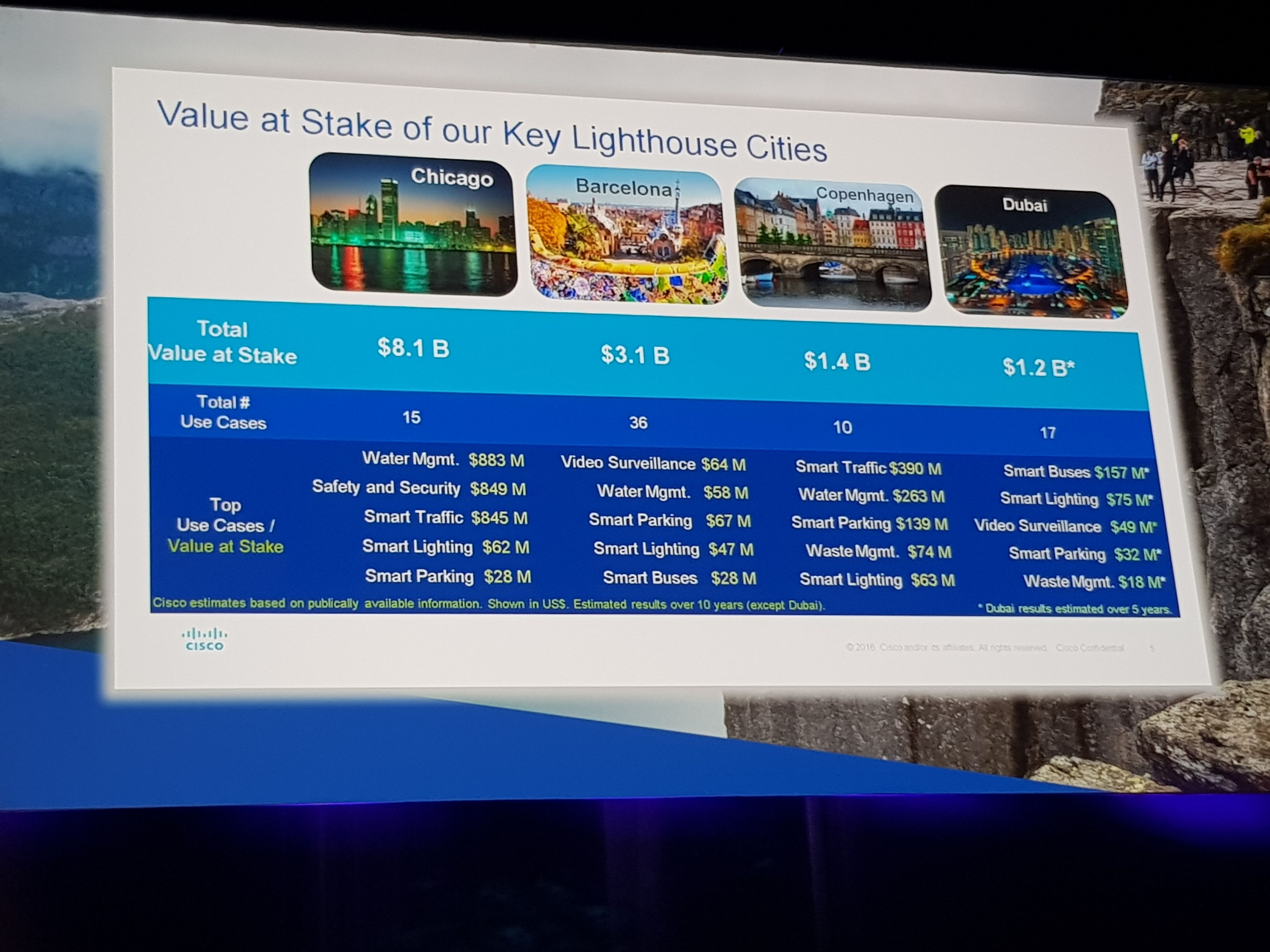
Overview over areas of applications for Smart City solutions and their estimate market value
But whoever turns out to be the winner in the battle for the IoT market, there sure is a lot of money to be saved through running traffic, managing waste, electricity etc more efficiently, and data-driven technologies have a key role to play in enabling this.
Anyways, despite having only shared some of the images that I took, and just some of the areas where we're currently looking at what new data and technologies can do for cities, this has already turned out to be my longest post ever on steemit. I hope that it gave you an overview of what we're talking about when we mention "Smart City" innovation and development, and that you found it as interesting as I do. It is certainly something that will have an impact on most of our lives as more and more people are moving to the cities, generating both challenges and opportunities in the process. Many questions will have to be answered with regards to the use of people's data and surveillance of citizens to improve social services, because although there are many benefits to using such information, it can also be misused. Perhaps a blockchain solution will have to emerge where citizens own their own data, and can choose to share it with the ecosystem in exchange for some payment?
Or how do you think the future of cities will be? Please tell me in the comments!
All images in this article without a stated source are taken by myself.
Just wanted to say that this might be the longest post you have ever made, but it is also one of the best and most interesting ones that you have produced! I applaud this effort, Fredrik, since I know how long it can take to write and edit a post of this length, but it was absolutely worth it! I read it in its entirety.
How exciting it must be to organize and attend an event like this (talk about the fancy side of working in science, uh?). Funny though, how you were received as a foreign guest in your own hometown :-D
Your honesty is much refreshing and very appreciated ;-) However, it is great to see some real life applications! Thanks for summarizing some of the most interesting features (I want a robot that brings chocolate to me as well, hehe).
Cheers, and congrats on being part of such an amazing event!
Despite its ambitious scope I did not even know about this conference. :D
How did you happen to get involved as an organizer anyway?
Although it did attract a lot more international organisations than in previous years, it is still mostly a nordic conference. It takes time to build international recognition, so I would not expect that this early.
I've made myself fairly well known in the political circles, among the interesting people leading the tech companies, and also in the innovation ecosystem and academia in the region, mostly by continuously showing up and setting off evenings to participate in conferences, workshops, and other events because I simply love it.
So I've been called up to help give ideas in to new initiatives like this in the past, and I did help create the Young programme for last year's conference. So when I moved to Paris to pick up my duties at the Space Agencies, and we were looking for a venue to organise a session on satellite data for smart cities, I already knew all of the people I would need to contact to make it happen. Which I did :P
Oh yes indeed, satellite imaging and smart city applications, I had not really thought of that.
I can see a reasonable connection there, you can use satellite based precision data for so many different things nowadays
Hi again @Fredrikaa.
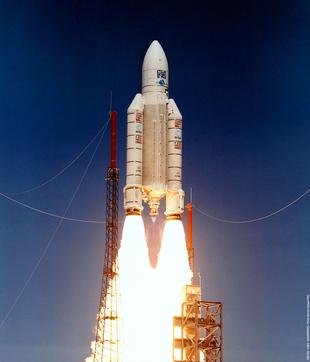
Once again it seems you have the dream job.
To bad I didn't hear of this expo before now. It seems like a very interesting place to be for a person like me who are constantly looking for new, smart ideas for developing.
Is this expo every year? See that it has been here for some years now.
And is it always hosted in Stavanger?
Since you work where you work, it would have been great if you could make some articles if you come over other interesting expo or the likes before they take place.
In that case, us mortals can many be able to by a ticket and attend :)
If you think this looks cool you should see where I am at in the Alps for work this week :D
Perhaps I should do a monthly post on my schedule of events and also a set of events I would have looked to join if I had the time :P
Yes it's a yearly conference and always held at Stavanger Forum.
I have never been to a tech expo yet and i am jealous! It is always good to hear about everything new and exciting being brought to the world, along with finding out about smart cities and their implementation of technology and people.
Surveillance and using people's data should never be done without consent, the blockchain solution would be a way to go but we need it to be done properly, not screwed up like plenty of things implemented in this world!
Glad to hear that! It's what I told the main organisers too: That they should not limit themselves to an audience from tech companies, academia and municipalities, but also look to make it fun to attend for "normal" citizens. Seeing how the future of cities might look, and partaking in a open dialogue on how developments ought to be, should not just be someone's job, it should be everyone's engagement.
Yup, as I mentioned briefly, I think a blockchain-like solution would be best. I can also imagine the SMT system being used to get citizens to participate in open innovation, and to discuss how and where the city can improve. But that's content and discussion for another post entirely ^^
Oh definitely, the people who aren't as likely to usually go to it need the appeal so they can go and enjoy.
SMT would be a good way to involve them and I can't wait to see how SMT changes things.
smart cities are the way to go especially with management of resources and environment. it create a better, safe and energy efficient city that maximize on the resources that they have. As we enter the age of internet of things (IOT) the smart connected cities will lead in innovation and management of technology
Same as you, I am less and less impressed by words, but enjoy a lot seeing actual results ^^
At first you are inspired and motivated, but then you're just tired and bored :P
And events like these do tend to blend in every buzz word in the alphabet ^^
Great to see that some thought is being given to this sooner rather than later. Interesting idea about using drones to deliver emergency services faster than an ambulance...
Also, looking at the photo of Smart City data use, Chicago, Copenhagen and Barcelona all have water management in their top three uses. Meanwhile, Dubai, surrounded by desert, doesn't seem to! (Made me smile :) )
Looks really interesting and inspiring! I would live to live in a "data-driven" connected city and I think a lot of business and startups can utilize open data about the city to create value for others and themselves, to create jobs and most importantly to raise the standard of living of the citizens.
As always, great post from you, I need to start keeping track of all your posts, not just hope that they'll pop up in my feed :P
That is an epitome of technology and science. Now our dreams are turning into reality.
It certainly brought a lot of cool tech together :)
Hehe, well a lot of work is still to be done to make everything go from dreams to reality, but this is a good start ;)
If we have taken the first step our half journey is already completed.
Hey @fredrikaa,
I applaud this effort since I know how long it can take to write and edit a post of this length, but it was absolutely worth it! thanks! I had a blast in reading it!!!
I studied mechanical engineering with a strong focus in renewable energy! I agree with your statement on the smart cities! in fact ETH also open a future cities lab in Singapour! Here is a video from all the poeple reading this great comment of your post @freedrikaa:
thee are the the main vision of those labs in general and i can categorize mainly in those:
Through Science
To achieve sustainability, science is essential. Science provides the basis for understanding how cities develop and interact with the environment at different scales. Cities are composed of physical stocks, resource flows, social institutions, and cultural catalysts which interactions generate a quantifiable ‘metabolism’. The scientific focus of our research is to quantify such metabolisms, and understand how they might be best structured for the benefit of sustainable cities.
By Design
A sustainable city must also be liveable. To achieve liveability, design is essential. Design is a collaborative process that combines analytical techniques, imaginative strategies and transdisciplinary knowledge to generate new ideas and bring them to fruition. Design skills bring often conflicting technical, economic, social, and cultural demands (such as environmental sustainability, profit, comfort, convenience, identity, security, satisfaction, and desire) into innovative and harmonious relationships.
In Place
Science and design are effective only if they serve places and the lives that are lived in them. Places result from common processes (growth and decline; competition and co-operation; ebb and flow of capital, people, goods and ideas; and climate change) and differentiating factors (geography, culture, language, and history). Our research addresses diverse lived places, from compact cities with high population densities to extended cities with a mosaic of urban and rural land uses.
Sorry if i was too long and thanks again for the post @freedrikaa
happy steeming
Francesco